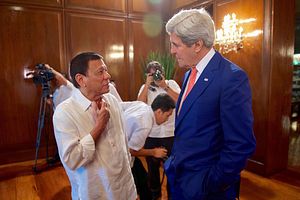In the latest development in a trend of awkward U.S.-Philippines interactions, Philippine President Rodrigo Duterte on Monday ordered all U.S. Special Forces to leave the southern island of Mindanao. U.S. Special Forces had been deployed to the region to assist Philippine security forces in their fight against the extremist militant group, Abu Sayyaf. Despite the training and information sharing provided by the United States, Duterte claimed that the U.S. presence worsens the situation and creates a target for Abu Sayyaf’s killings and kidnappings.
“For as long as we stay with America, we will never have peace,” he declared.
Unfortunately, Duterte’s demands are only the most recent upset to the U.S.-Philippines relationship in a chain of tense interactions that have largely defined the Duterte presidency. One major source of tension has been Duterte’s crackdown on the drug trade in the Philippines. Following up on a campaign promise to kill 100,000 criminals in his first six months as president, Duterte launched an anti-drug policy that has resulted in the extrajudicial killings of over 1,800 Filipinos since he took office in June of this year.
International outcry has failed to deter Duterte from this path. When the UN urged Duterte to stop the killings, the Philippine president threatened to leave the organization. More notoriously, Duterte preempted reports that the Obama administration planned to address the extrajudicial killings by calling President Obama a “son of a whore” (this nearly a month after calling the U.S. ambassador to the Philippines a “gay son of a whore”). Obama subsequently canceled his meeting with Duterte in Laos and Duterte issued a hollow apology expressing regret that his remarks “came across as a personal attack on the U.S. president.” While Deputy National Security Advisor Benjamin Rhodes maintains that the alliance remains “rock solid,” one wonders what more Duterte could do before the White House starts changing its rhetoric for the U.S. relationship with the Philippines.
The Philippines’ precarious position in the South China Sea escalates the impact of Duterte’s behavior from awkward gaffes to concerning displays of betrayal for the U.S.-Philippines alliance. Although the Permanent Court of Arbitration handed the Philippines a huge win in July with a ruling that invalidated most of China’s territorial claims in the region, China has by no means submitted to the ruling or sought any face saving way out. In fact, Beijing has pursued the opposite course of action. In the nearly two months since the court’s ruling, China has conducted military exercises in the South China Sea and launched a satellite that Beijing claims is intended to safeguard the nation’s maritime interests. Furthermore, while the G20 Summit convened in Hangzhou, the Philippines reported that Chinese Coast Guard vessels positioned themselves near the disputed Scarborough Shoal, located within the Philippines’ exclusive economic zone.
The U.S.-Philippines Enhanced Defense Cooperation Agreement (EDCA) was created to protect against provocative actions like these. Reaffirmed by the Philippines’ Supreme Court on January 12, 2016, the EDCA allowed the United States to establish bases at five locations in the Philippines and solidified the importance of the U.S.-Philippines defense alliance in the face of a looming Chinese presence. Analysts have called the EDCA critical for developing minimum credible deterrence against threats in the region. However, the value of this alliance is incongruous with the disregard Duterte continues to demonstrate for the United States.
Duterte’s recent behavior demonstrates that either the EDCA has enabled an extreme amount of moral hazard or that Manila no longer considers Washington an important defense partner. By boldly guaranteeing military action if China attempts to take control of the Scarborough Shoal, Duterte threatens armed conflict with China that he could not wage without the support of the United States. However, Duterte’s attitude also resembles the sort of “go it alone” isolationist fever that seems to plague many of his contemporaries, so his apparent disregard for U.S. support could be genuine. It’s also possible that neither of these options explains the behavior and that Duterte is, as Obama said, just a “colorful guy” who sometimes forgets to keep the importance of the U.S. alliance in perspective (although the three are not entirely mutually exclusive).
In the end, the explanation for Duterte’s behavior matters less than whether or not the United States and the Philippines can present a strong alliance in a region of territorial disputes and terrorist threats. While Rhodes’ comments on the enduring strength of the relationship show Washington pulling its weight, Manila must do the same. If it fails to do so, the United States should critically consider the value Duterte brings to the relationship.
Phoebe Benich is a DC-based analyst on Asia-Pacific security affairs.

































